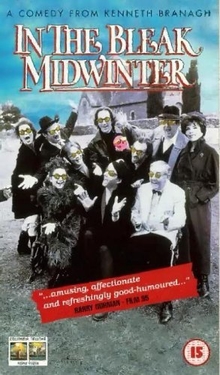Plot
Joe Harper, a depressed and down-on-his-luck actor, asks his agent Margaretta D'Arcy to lend him money to put on a Christmastime production of Shakespeare's Hamlet in his hometown of Hope, Derbyshire. Wanting the rendition to be "free and experimental", Joe holds auditions that attract a variety of performers, most of whom Margaretta thinks are mad. In the end, Joe casts six actors: the well-meaning Nina Raymond; the long-suffering and cynical Henry Wakefield; the flamboyant homosexual Terry DuBois; the vain Tom Newman; alcoholic-in-denial Carnforth Greville; and former child actor Vernon Spatch. Joe casts himself as Hamlet.
Recruiting his sister Molly, Joe transports the actors and props their venue: a decrepit church that is due for demolition by developers. Despite being disheartened that the venue is also their digs, as well as not having expenses paid for them, the actors decide to stay. There, they meet their costume and set designer, the new-age Fadge, who proposes to have some of the audience as cardboard figurines and use only smoke for set design.
Rehearsals begin with a shaky start. Carnforth cannot remember his lines and often turns up drunk, Tom insists on using outrageous accents for each of his roles, Henry hates sharing a room with Terry, Nina's bad eyesight causes accidents, and Molly is forced to play Hamlet during rehearsals so Joe can direct. Later, the landlord of the church demands an extra week of rent, which Joe does not have, and the show does not sell a single advance ticket. Four days before the tech run, Joe insists the actors do not lose their nerve, and receives encouragement from Nina, who he learns is a widow.
Vernon comes to Joe's rescue by giving out flyers and selling tickets on the streets and at a hotel he is performing a cabaret at. Henry and Terry gradually learn to tolerate each other through their mutual respect of Henry Irving. Terry reveals he has an estranged son, Tim. This makes his role as Gertrude difficult as Joe encourages the actors to be the characters. One night, Tom breaks down from Carnforth's mistakes, Joe's direction and Vernon's insistence in documenting the production. This makes Joe suffer his own breakdown, saying that the production was a mistake, that it has become too personal for them all, that their time has run out and that he has no money to pay for them nor securing the venue for the run of the show. Calming down, Henry and Molly reassure him to continue.
With Joe now acting during the rehearsals, the production improves significantly. Vernon reveals to Joe the company has had a whip-round to improve the financial situation. After the technical rehearsal, Joe receives a call from Margaretta, who tells him that he has been offered a three-picture movie deal from American producer Nancy Crawford, but he has to cut off before she tells him about travel arrangements. On Christmas Eve, the night of the first performance, Margaretta arrives early to tell Joe that he has to leave to catch a flight to Los Angeles with Crawford - meaning he will be absent from the first performance. The company begrudgingly say their farewells to Joe, with Molly filling for Hamlet and Nina tearfully begging for Joe to stay for his well-being, to no avail.
The audience arrives, including Carnforth's mother, Nina's father and Tim (who Henry contacted, telling him that Terry has cholera). Crawford and Margaretta also arrive along with a national newspaper reporter. During Molly's first scene, Joe returns, having been allowed to do the first performance and let Crawford see him act live. The production goes well, and the company meet backstage, where Crawford reveals that she only watched the performance to see why Joe rejected her offer. Instead, she offers Joe's role to Tom, who has Fadge brought along as a designer for the film, and Margaretta offers herself as an agent to them.
When the audience leaves, the company starts dancing, and Nina and Joe begin a relationship as Christmas Day begins.
